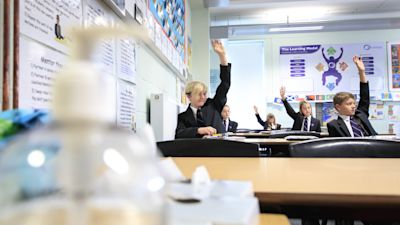Teachers call for school closures to avoid a longer lockdown in England

Video report by ITV News Correspondent John Ray
Thousands of teachers and support staff have backed a campaign to close schools and colleges as part of England's new lockdown to tackle the rising cases of coronavirus.
Prime Minister Boris Johnson announced a month-long lockdown in England from Thursday but has said that schools, colleges and universities will remain open.
More than 150,000 teachers and support staff have backed the National Education Union’s (NEU) campaign to close schools and colleges during lockdown, warning that they could be an “engine for virus transmission".
It comes as a leading medical figure warned that not closing secondary schools could lead to a longer lockdown.
Professor of infectious diseases epidemiology at University College London, Andrew Hayward, said it is clear there is “substantial transmission” within secondary schools.
Professor Hayward, a member of the Government’s New and Emerging Respiratory Virus Threats Advisory Group (Nervtag), told BBC Radio 4’s Today programme: “I think it’s clear that there is substantial transmission within secondary schools. And we are of course needing to prioritise education and we know that children who are infected in schools are very unlikely to have severe consequences.
“But I think one of the consequences of not closing secondary schools would be that we may need to be in lockdown for longer than we might otherwise have to be.”
On Saturday, the NEU - Britain's largest education union - launched a campaign calling for the Government to close schools and colleges with the introduction of new national restrictions.
In less than 48 hours, more than 150,000 teachers and support staff have voiced their support and over 20,000 have written to their MP and lobbied them on social media, according to the NEU.
Kevin Courtney, joint general secretary of the NEU, said: “The response to our call this weekend for school closures shows that our concern is widely shared.
“The Government is failing our communities as well as our schools and colleges and that is why we are seeking an amendment to Parliament’s lockdown bill.
“We have seen a fifty-fold increase in infections in secondary schools alone since September. Schools, clearly, are an engine for virus transmission.”
The PM has faced criticism by not taking action sooner during the half term break after the Scientific Advisory Group for Emergencies (Sage) recommended on September 21 that a shorter “circuit-breaker” lockdown was needed.
Prof Hayward acknowledged “we can’t turn back the clock” on imposing restrictions.
“But I think if we had chosen a two-week circuit-break at that time, we would definitely have saved thousands of lives,” he added.
Manchester mayor Andy Burnham has called on the Government to close schools in Manchester for a two-week "circuit break".
But Labour leader Sir Keir Starmer told the BBC's Andrew Marr show on Sunday that schools must stay open.
"The harm caused to children by not being in school is huge," he said. "But we have got to manage the risk.
"What I said to the Prime Minister in September was what you should do is elevate if you like children and staff and teachers to the status of NHS staff and that means having mass targeted testing at schools on a weekly basis."
But he conceded that getting the R number down may take longer with schools remaining open.
Meanwhile, schools in Northern Ireland will reopen on Monday after they were closed for an extended period over the half term holiday to curb rising infection rates.
The NEU is also calling for rotas to be introduced in secondary schools and sixth form colleges at the end of the lockdown period.
Julie McCulloch, director of policy at the Association of School and College Leaders (ASCL), suggested that rotas should be considered first if further restrictions are needed in schools in England.
She said: “The situation with Covid infection rates is clearly very precarious and there may need to be further restrictions which affect schools.
“But it is important that we don’t see this as an all-or-nothing situation. A first step, if it is needed, could be to introduce a rota system in secondary schools with pupils rotating between remote education and attendance in school.
“The priority, alongside keeping pupils and staff as safe as possible, must be to keep as much direct teaching going as we can to minimise further disruption to these young people.”
Speaking on Monday, Dr Susan Hopkins, deputy director of Public Health England (PHE), said the majority of coronavirus infection in children was related to “infection in their households”.
Asked if the transmission risk in schools was high, she told Times Radio Breakfast: “We don’t know exactly. We do know that the majority of children have infection that’s related to infection in their households, which is clearly the most likely place that children will get infected.
“We know that, over the summer, families and people have been all back in work and going out and socialising, so there are many routes of infection and bringing it into the household.”
She added: “We have also agreed that we want our children to be in education, that we think that the damage done from a year of children’s education lost is too high for us to accept as a society.”